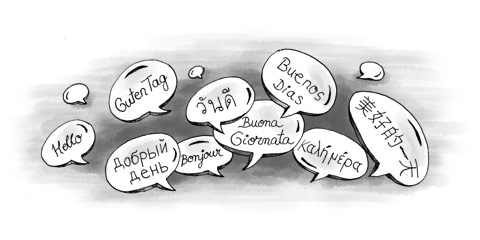Portuguese, the only official language, is known by 80% of the population as the primary or secondary language. The six Bantu languages most widely spoken: Umbundu, Kimbundu, Kikongo, Chokwe, Kwanyama also called Oshikwanyama, and Ngangela. Other than that, in Angola there are 42 local languages, one of them, Kwadi, has no known speakers and others are Khoisan, not Bantu, languages.
Portuguese
There are around 7.5 million first-language speakers of Portuguese although only around 25% of the total population are native Portuguese speakers.
Most Angolans speak Portuguese as a second language. During Portuguese rule, Angolans were required to be Roman Catholic and speak Portuguese, which lead to many families speaking only in Portuguese in order to offer a better education to their children. It became an instrument for independence and national identity and now that it is widely spoken, the government counts on it because it is also an international language.
Angolan Portuguese is similar to Brazilian Portuguese due to historical reasons but the pronunciation is more European with some influence from the phonology of local languages. It also has some remnants of Old Portuguese that can be found especially in some popular grammar uses.
As in many other countries, there are local variations of Portuguese that may include some different lexicon. In the capital, Luanda, Portuguese isn’t influenced as much from tribal cultures making it quite standard.
However, there are several Kimbundu influences, especially for slang, and some of it has reached young Angolans. Some examples of Kimbundu words in used in Angolan Portuguese would be:
- cubata (Kimbundu) = casa (Portuguese), 'house'
- muamba (Kimbundu) = ensopado de galinha (Portuguese), 'chicken stew'
- quinda (Kimbundu) = cesta (Portuguese), 'basket'
- giumbo (Kimbundu) = machete (Portuguese), 'machete'
- milongo (Kimbundu) = remédio (Portuguese), 'medicine'
- quituxe (Kimbundu) = crime (Portuguese), 'crime'
- bazar ("to go away/home")
- garina (Kimbundu) = garota (Portuguese) ‘girl’
- bumbar (Kimbundu) = festejar (Portuguese) ("working" in Angola, "partying" in Portugal; sometimes altered to become bombar)
- farra (Kimbundu) = festa (Portuguese) ‘party’ in Angola; ‘wild party’ in Portugal)
- bué (Kimbundu) = muitos (Portuguese) ‘many, a lot’
- iá (Kimbundu) = sim (Portuguese) ‘yes’
Umbundu
Concentrated in the center-west of the country and spoken also in Luanda, it is the most widely spoken Bantu language, about a quarter of the population are native speakers.They are known as Ovimbundu, in the Bantu family.
Kimbundu
Spoken by around 3 million people, mostly in the north-west of the country, it is from the same language family as Umbundu. Along with Umbundu, some words have made it to European and Brazilian Portuguese, such as banjo (banjo), quilombo (organization of houses created by escaped slaves) or tanga (string, loin-cloth). One of the alternative names for Kimbundu, Luanda, gives its name to the capital of the country.
The speakers are known as Mbundu.
Kikongo
Kongo language or, Kikongo, has around 7 million speakers in the world, both in Angola and surrounding countries, as well as some creolized forms of the language in several Caribbean countries. It is a lingua franca in much of west central Africa and its word formation is simpler than other Bantu languages.
It is also known as Kituba, although this is more a creole version of the language influenced by both African and Romance languages.
It was the first Bantu language that was written in Latin characters and the first one that had a dictionary. If you want to read about Kikongo in Kikongo: http://kg.wikipedia.org/wiki/Kikongo/Kituba
Chokwe
Chokwe is spoken by almost half a million people in Angola, the Chokwe. They were part of the twelve clans of the great Lunda Empire until they became independent from them. The Portuguese had no contact with them until the 1930’s.
It’s one of the national languages of Angola and the lingua franca for the east of the country.
Some words in Chokwe: mutu - (person); chimene-mwanyi - (good morning); xingai? - (how much is it?); iximo - (I don’t have)
Kwanyama (Oshikwanyama)
It is spoken by about 420,000 people in Angola, both Kwanyama and Ovambo people. Another Ovambo language is the Ndonga. The mix of Ndonga an Kwanyama is called Oshiwambo. Both Kwanyama and Ndonga are the two written Ovambo languages.
Here you may find some useful words and expressions in Kwanyama: www.gregvogl.net/namibia/phrasebk.htm
An example of Oshiwambo news in the local newspaper The Namibian.
If you are keen to learn check out this Oshikwanyama language course book.
Ngangela
It is spoken by several thousand people, the Ngangela or Nyemba. Many Ngangela have mixed with close ethnic groups and therefore, they have lost their language or they have mixed it with the closest one.

